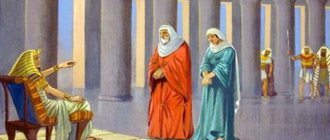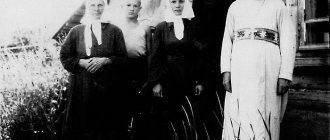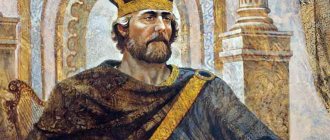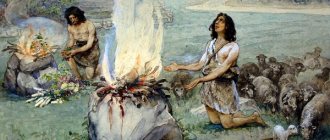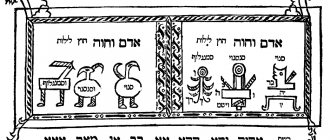The Bible tells readers many interesting and touching stories. We meet interesting characters who perform great feats, sometimes finding themselves in fantastic or difficult circumstances, but with the help of God they remain unharmed.
The story of Abraham, the progenitor of the Jewish family, and his wife is a story of deep trust in the Almighty. The life of these ancient people was full of trials, difficulties, passions, mistakes, but they always followed God, even when it was hard and they could not believe that the Lord would fulfill his promises.
One of the most striking female characters in the Old Testament was the wife of the forefather of the Jewish people. What was the name of Abraham's wife, her life story, behavior, character, purpose and fate will be shown in this article.
Where it all started
The Bible tells us that Abram lived with his father and brothers in the Sumerian city of Ur, located on the banks of the Euphrates River. Ur was famous for its ports, where many ships were moored. This large city quickly grew rich in trade with other lands, including Canaan. Abram's father, Terah, decided to leave Ur and go the hard way to Canaan. When they reached a place called Harran, the father died and Abram became the head of the family.
At this time, God appeared to Abram and said that he must leave his home in Haran and follow to the lands that the Lord would show him. This choice was difficult for Abraham. He loved life in the city, but did not want to run away from God, he listened to the voice of the Creator and trusted Him. The Lord said that Abram would become the forefathers of an entire nation if he obeyed Him. God changed his name to Abraham, which means “parent of many.” In the 12th chapter of the book of Genesis we read the following lines:
And the Lord said to Abram, Get thee out of thy country, from thy kindred, and from thy father's house, unto the land that I will show thee; and I will make you into a great nation, and I will bless you, and I will make your name great, and you will be a blessing.
In Harran, Abraham left the farm to his brother, Nahor, and he himself chose the path of a Bedouin cattle breeder. His nephew Lot and his faithful wife left the rich lands with Abraham. Abraham's wife's name is Sarah.
Sarah - one of the foremothers of the Jewish people
Sarah is revered among the forefathers as one of the foremothers of the Jewish people. The foremother or matriarch is the first woman or wife known by genealogy in a married couple.
From it originates a clan, generation, house or tribe. Such a woman is also called a great-grandmother. There are four foremothers of the Jewish people:
- Sarah - Abraham's wife;
- Rebekah (Rivka) - wife of Isaac;
- Leah (Leah) - 1st wife of Jacob;
- Rachel (Rachel) - Jacob's 2nd wife.
Archbishop Gennady of Novgorod.
Miniature of the Facial Chronicle The veneration of forefathers and foremothers begins in the early Christian church in the second half of the 4th century. Moreover, individual cases of such veneration are known in the practice of Judeo-Christian communities of the first Christian centuries.
Its origins are taken in the Jerusalem church. In Christianity, the memory of foremothers, like forefathers, is established before the Nativity of Christ. Its meaning is to remember the chain of generations preceding the birth of the Savior.
1498
this year all the books of the Old Testament were translated into Slavic
Forefathers and foremothers, including Sarah, were not revered in Rus' as actively as the characters of the New Testament.
The fact is that before 1498, the Novgorod Archbishop Gennady (Gonzov) translated all the books of the Old Testament into Slavic.
From this moment on, interest in the Old Testament arose. Before this, in the Slavic world only the New Testament and fragments of the Old were read. The latter were called Paremias.
Abraham betrays Hagar into the hands of Sarah. North Dome; Italy. Venice. St. Mark's Cathedral; XIII century; location: Italy. Venice, St. Mark's Basilica; Location: Dome
The publication of the Old Testament in the Slavic language led to the fact that icons of forefathers and foremothers began to appear in monasteries. This is due to the fact that priests and monks were considered the most educated in Rus'.
They also ordered icons, paintings and iconostases. That is why icons of Sarah can be found in churches and monasteries.
Believers in Russia usually venerate the saints of the New Testament, and it is quite difficult to find an icon of Sarah in their homes.
Video: Old Testament - Abraham and Sarah.
By leaving a comment, you accept the user agreement
The meaning of the name and appearance of Sarah
Let us dwell on the image of Abraham's wife. Abraham's wife in the biblical tradition was named Sarah. Translated from Hebrew, the name Sarah means “princess”, “mistress of many”. At birth, Sarah had a different name - Sarah or Sarai, which meant “noble.” But God, when he added the second letter a to Abram, did the same with Sarah, only added a second r to the name. This began to mean that Sarah would be the mother of a large people.
Sarah became Abraham's wife in Ur of the Chaldeans, where they grew up and lived until they decided to go to the land of Canaan. She was her husband's half-sister. Abraham's wife Sarah accompanied her husband on all his travels and was about 10 years younger than him. Sarah is considered the ancestor of the Jewish people. But at the time she left Ur, the nationality of Abraham's wife was not yet Jewish. Their descendants began to be called Jews. With a greater degree of probability, we can conclude that Sarah was a Chaldean, since she grew up in Mesopotamia, on the right bank of the Euphrates River, where the Chaldeans lived in those days.
It is clear from Scripture that Sarah was a very beautiful woman. There are no verses in the Bible that praise Sarah's beauty, however, if we take the narrative context, we can conclude that Abraham's wife was beautiful.
Looking ahead, let's say that his girlfriend was so beautiful that Abraham, fearing for his life, tried to pass Sarah off as his own sister when they lived at the court of the Egyptian pharaoh and the king of Gerara, Abimelech. Abraham had much to fear. Then there were many cases when rulers, without hesitation, could kill a person and take his beautiful wife to themselves. Abraham's wife obediently followed her husband's commands and obeyed him in everything.
Seeing Sarah's righteousness, the Lord gave her a new name
When Ishmael was 13 years old, the Lord announced to Abraham that He would give him a Son from Sarah,
“And nations will come from her, and kings of nations will come from her.”
(Gen. 17:16)
Thus, God made her the ancestor of not only the Jewish people, but also of several others. These are some Semitic peoples and Arab tribes.
Abraham, Sarah and three angels. Vision of Abraham under the Mamri oak. Mosaic. 432 - 440 Rome, Church of Santa Maria Maggiore. The Lord showed Abraham his Will, informing him that he would have numerous offspring from Sarah
The Lord's announcement to Abraham of the news that He would make him, through Sarah, the father of a large offspring, took him by surprise.
He couldn’t believe it, because she was already very old. Therefore, the prophet humbly answered the Lord that he would be glad to have large offspring from Ishmael.
The Lord again promised him that he would receive offspring precisely from the son of Sarah.
When the Holy Trinity came to inform Sarah that in a year she would give birth to a son, she was already 90 years old.
It should be noted that this news became a kind of Covenant (agreement) that God concluded with Abraham and Sarah. That is why He decided to give them new names. Previously, Abraham was called Abraham, and Sarah was Sarah or Sarai.
In addition, the conclusion of such a covenant was accompanied by a symbolic order of circumcision.
Thus, Abraham and Sarah received the blessing of the Lord to own the lands, as well as to become the ancestors of new nations.
Abraham, Sarah and the angel Jan Provost. 1520. When Sarah received the news that she would have a son, she laughed so hard that she was 90 years old at that time.
Soon after receiving the revelation from the Lord, three travelers who looked like Bedouins came to Abraham’s tent. In fact, three Angels sent by the Lord came to the prophet.
Like hospitable hosts, Aram and Sarah invited them into the tent, brought them water to wash their feet, and treated them to delicious dishes.
The messengers announced to the couple that within a year they would have a son. Sarah laughed in secret at this news, because she was 90 years old.
Isaac is the son of Sarah and Abraham. Isaac means laughter in Hebrew.
Character of Sarah
Abraham's wife Sarah was not an obedient puppet in the hands of her husband.
Yes, she obeyed Abraham, but she had a harmful and at times stubborn character, thanks to which she could insist on her decision. In Genesis chapter 21, verse 12, God personally tells Abraham to obey the voice of his wife:
in everything that Sarah tells you, obey her voice.
Abraham regularly turned to his wife for requests or advice, and also considered it important for himself to get Sarah's approval in order to make this or that decision.
As described in the Bible, Sarah, Abraham's wife, told her husband what to do, and he carried out her requests. An example is the relationship between Sarah and Hagar. Sarah asked Abraham to throw out the maid who had given birth to his son. Abraham did not want to throw Hagar out, but Sarah showed toughness in her character, and he was forced to listen to his wife. Abraham sent the maid and her son into exile, although he did it against his will.
Sarah in the Divine Comedy
The character of Sarah is also included in the 32nd Canto of Paradiso from Dante Alighieri's Divine Comedy. Here, in particular, we find it at the junction in which San Bernardo shows Dante, now in paradise, the places where the blessed of the Old and New Testaments abide.
As you can see, in the order in which the third places are formed, Rachel is sitting below her with Beatrice.
Sarah and Rebecca, Judith and she who was obliged to the cantor, who from the pain of the phallus said: “Miserere mei”,
So you can see from door to door down and down how I, in my own name, go down from leaf to leaf in search of a rose.
Sarah in Egypt
When Abraham left his home in Harran and wandered through the land of Canaan, there was a severe famine in these parts; there was no food. So he went to Egypt to support his family and servants.
When Abraham found himself in Egypt, he gave Sarah to the palace of Pharaoh. A logical question arises. Why did Abraham give his wife to Pharaoh? The answer lies in the character of Abraham. He was afraid that he would be killed. Even in Canaan, he heard from travelers who met on his way that the Egyptian pharaohs, if they see a beautiful wife from their husband, will do everything so that the woman becomes an adornment of their court. Many men suffered from the rulers' desire to possess their wives and were killed. For this reason, Abraham gave his wife to Pharaoh - in order to stay alive.
In the 12th chapter of the book of Genesis we read that on the way to Egypt, Abraham asked Sarah not to tell anyone that they were spouses. He persuaded him to say that she was his sister, then he would be left alive and the pharaoh might well give him gifts:
and when the Egyptians see you, they will say, “This is his wife.” and they will kill me, but leave you alive; tell me that you are my sister, so that it may be good for me for your sake, and so that my soul may live through you.
Sarah obeyed her husband, as she had done before. She realized that such a move could lead to family enrichment and prosperity. Abraham was a savvy man; before, his cunning brought them only benefit.
And so it happened. In Egypt, the beauty of Sarah attracted the attention of the nobles of Pharaoh, she was taken to serve in the palace, and “brother” Abraham was given small and large livestock, male and female slaves.
But God did not want Abraham to live in deception and not fulfill his destiny. The Lord struck Pharaoh and his family with a terrible disease, and then the deception on Abraham’s part was revealed.
One day, Pharaoh called Sarah and Abraham to him. He asked why they deceived him, because soon Pharaoh was planning to marry Sarah and take her as his wife. The ruler of Egypt was very upset, but was merciful and drove the deceivers out of the palace, and his servants escorted them to the border with Canaan.
Sarah and Hagar
After Egypt, Abraham returned to Canaan with his family, livestock, and slaves. Between Bethel and Ai, at the sacrificial stone that he had made long ago, Abraham thanked God for keeping him on the road and keeping him from the wrath of Pharaoh. At this point, Abraham parted with his nephew Lot, who decided to separate from his uncle and live independently.
Abraham settled in Hebron, near the oak grove of Mamre. God's promise that Sarah would give birth to a child from whom Abraham's descendants would come was still not fulfilled. The Lord repeatedly confirmed his covenant with Abraham that he would give them a child. Time passed, Sarah grew old, and no heir was born. Then Sarah decided to take this problem into her own hands and thought that if she was not destined to give birth to a child, let the servant give birth to her and Abraham.
Sarah brought to her husband the maid she had brought with her from Egypt. The maid's name was Hagar. She told Abraham to spend the night with her so that Hagar could conceive a child. It is interesting that Abraham listened to Sarah. In Genesis 16:2 we read:
Behold, the Lord has shut up my womb, that I should not give birth; Go in to my maid; perhaps I will have children by her. Abram listened to Sarai's words.
Sarah assumed that when Hagar gave birth to a child, she would be able to take the child to her so that her husband would have a long-awaited heir to whom he could leave all his property.
Abraham, without asking any questions, followed his wife’s advice and came to the maid’s tent to conceive a child. They spent a pleasant night, after which Hagar realized that she was carrying a child within her.
When Hagar found out she was pregnant, she hated her mistress, Sarah. From the biblical context it follows that Sarah ran to her husband and began to scold him, express her complaints to him, and declare Abraham guilty of her situation: what is this, I let you spend the night with my maid, and she despises me. Of course, a very strange act by a woman: she became an organizer herself, allowed her husband to cheat with a maid, and then looks for those to blame on the side. In verse 6 of chapter 16 we read Abraham's response:
Behold, your handmaid is in your hands; do with her what you please.
Abraham washed his hands of the matter and left the fate of Hagar to his wife, because she is her servant, let Sarah deal with her herself. And Sarah began to oppress, insult and humiliate Hagar. Most likely, the maid was brought to such a state that she could no longer tolerate her mistress’s insults, and left the Mamre oak grove and ran away.
When Hagar found herself in the desert, an angel of God appeared to her. He told her to return to Abraham and Sarah and become obedient to her mistress. An angel conveyed God's message to Hagar that she would become a great nation (Genesis 16:10):
By multiplying I will multiply your descendants, so that they cannot even be counted from the multitude.
Hagar returned to Sarah and gave birth to a son, whom she named Ishmael. He is considered the ancestor of the Arab tribes.
Sarah in this episode represents a shrewish, vindictive woman with a sinful human nature. Sarah is an ordinary person. She does not see her mistakes, but tries to blame others for the misfortunes that happen in her life.
Sarah dreamed of a child for many years, but could not give birth to one.
Already the first mention of Sarah in the Holy Scriptures is associated with the story of her barrenness (Gen. 11:29-30). Its purpose is to emphasize the unshakable faith that the Divine promise of numerous offspring will be fulfilled (Gen. 12:1-4).
When she turned 75, she decided to take measures to ensure that her husband had offspring. To do this, forgetting about all her needs and showing self-sacrifice, she gave Abraham her slave Hagar as a concubine.
After Hagar, Sarah's slave, gave birth to a son for Abraham, she began to treat her with disdain.
After Hagar became pregnant, she felt superior to her mistress and began to treat her with disdain. Despite the fact that Sarah suffered humiliation and insults from her, Abraham did not interfere in the relationships of women.
After Abraham's first son was born from Hagar, he was named Ishmael. This further increased Sarah's suffering because she herself did not become a mother.
Sarah gives Hagar to Abraham. Louis Jean Francois Lagrenee (1724 - 1805). Since Sarah could not give birth to a child, she decided to give her slave Hagar so that she would give birth to offspring for Abraham.
This circumstance indicates her qualities such as humility and submission. Even having an example of her infertility in the form of Abraham’s child from another woman, Sarah does not stop loving him and remains with him.
In addition, this example is an example of faith in God, who promised to produce numerous offspring through Sarah to Abraham.
Abraham's Guests
As Abraham sat at the entrance to the tent, like a true Bedouin, he noticed that three people were approaching him. Abraham ran up to these people and bowed, he somehow learned that one of the guests was the Lord. He was glad that God had come to visit him. The owner of the house began to fuss to feed the guests. Women were responsible for the household. Abraham ran to Sarah and asked her to bake unleavened cakes for the dear guests, and asked the servant to take the best calf and cook it.
The guests told Abraham that God would give him offspring and fulfill His covenant; what He promised would be fulfilled. Sarah overheard what her husband was talking about with the guests and laughed. It was funny to her that she could still give birth to a child. Sarah understood that she was old, and usually all the reproductive functions of the body at this age are no longer active.
The Lord did not understand Sarah’s laughter. The answer is described in the Bible: Abraham's wife, Sarah, shared her doubt that it was impossible to give birth to a child in old age. To which the Lord told Abraham that the child would be born next year.
When Sarah, Abraham's wife, heard what one of the guests said, she lied and said she didn't laugh. But nothing can be hidden from the Lord; He knows the heart of every person. Sarah was afraid that she doubted God's words, and so she told a lie.
Abraham, Sarah and Abimelech
Abraham wandered through the land of Canaan and on his way stopped in the city of Gerar, whose king was Abimelech.
In Gerar, the same scenario happened to Abraham as in Egypt. Abraham does not learn from mistakes, or vice versa, he realized that by passing off his wife as his sister, he could get benefits.
When in Gerar they saw that Abraham’s wife was a very beautiful woman, they told the king about this, and he in turn ordered her to be brought to the palace along with her man. Abraham, appearing before Abimelech, deceived the king, declaring that this was not his wife, but his sister. Sarah was silent and obeyed her husband in everything.
At night, the Lord came to Abimelech in a dream. He warned Abimelech not to touch Sarah and to return her to her husband in the morning. God warned the king that if he did otherwise, He would kill him and Abimelech’s entire family.
At dawn the king called Abraham and his wife to him. Abimelech was indignant at why Abraham did this to him; he asked him what prompted him to do such an act. Abraham stood before the king and honestly confessed everything. He said that he was afraid that he might be killed for the beautiful Sarah. Abraham explained to Abimelech that he and his wife agreed that no matter what land they came to, Sarah should say that Abraham was her brother. The forefather of the Jewish people partially lied. Sarah was his wife, but on their father's side they were brother and sister, but their mothers were different.
Abimelech returned his wife to Abraham, gave him money (silver shekels), livestock and slaves. The king of Gerara told Sarah that she was now justified before people and clean.
biography
The figure of Santa Sarah , first the wife of Abraham and mother of Isaac , is the cornerstone of all Christian churches. In fact, it is the object of worship of Catholicism, as well as other monotheistic religions, namely Islam and Judaism, although there are no holidays dedicated to it in the liturgical calendars.
Santa Sarah
Fulfillment of the covenant
As God promised, the next year Sarah gave birth to a child, and they named him Isaac. The birth was not easy, Sarah was old.
After giving birth, Sarah looked at the child and grumbled that people would laugh when they found out that the old woman not only gave birth to a child, but was also able to breastfeed. In the 21st chapter of the book of Genesis we read:
And Sarah said, God made me laugh; whoever hears about me will laugh. And she said, Who would have said to Abraham, Sarah will suckle the children? for in his old age I gave birth to a son. The child has grown up and is weaned; and Abraham made a great feast on the day that Isaac was weaned.
Abraham rejoiced that the heir promised by God had been born, a child from whom would come a large nation. On this occasion, when Sarah stopped breastfeeding, he threw a rich feast.
Death over a hundred years
Sarah died in 1901 BC. motherhood at 90 he notes the miracle of this character, the age of death is even more important: 127 years old, when Isaac is now 32 years old. She is buried in the Tomb of the Patriarchs o Shrine of Abraham. This place of worship is located in Apron (today Kiryat Arba in the West Bank), which is visited by Jewish, Christian and Muslim worshipers.
Abraham, Sarah, Isaac, his wife Rebecca and their son Jacob and Leah are said to vacation in this complex. We have traces of this place in chapter 23 of Genesis. Here, in particular, we read:
“Abraham buried Sarah his wife in a cave in the camp of Makpelah before Mamre, that is, in Hebron, in the land of Canaan.”
Therefore, even after death, Sarah connects herself with God and rests forever in the promised land.
Goodbye Hagar
Sarah began to notice that Ishmael, the son of Hagar from Abraham, loved to mock the young Isaac - to tease and laugh at him. Sarah did not like this behavior of Ishmael. She came to Abraham and threateningly declared that her husband should drive out the slave and her son.
Sarah was cunning. She took advantage of the moment to get rid of the hated servant, Abraham's firstborn son Ishmael, so that her son would receive all the property that would come to him from his father.
Abraham submitted to his wife. He remembered the Lord's words that he should listen to Sarah's voice.
Early in the morning, Abraham collected bread and water, gave it all to the maid and sent her and Ishmael away from his tent. Abraham had a hard time parting with his firstborn, whom he loved, but he did not want to go against the will of his wife and God.
Hagar and her son wandered through the desert and got lost. When the water and food ran out, Ishmael was close to dying. Desperate Hagar laid her son under a tree, and she herself walked away so as not to see the death of her beloved youth. Hagar sat down on a stone and began to cry. But God did not abandon the Egyptian woman. An angel came and pointed her to a source of water. Happy Hagar and Ishmael ran and drank from the well. They settled next to a source of water. When Ishmael grew up, Hagar found him an Egyptian wife, with whom he had 12 sons.
From Ishmael came the Bedouins and some Arab tribes
Hagar, Sarah's slave in the Old Testament, is not portrayed from the best side. So she mocked her and oppressed her.
Sarah, using her right as the mistress of a slave, answered her. As a result, Hagar once even ran away into the desert, and the Angel of the Lord commanded her to return to Abraham.
Muhammad meets the prophets Ishmael, Isaac and Lot in paradise. From the Apocalypse of Muhammad, written in 1436 in Herat, Afghanistan (now in the Bibliotheque Nationale, Paris)
Despite the fact that Abraham loved Hagar and Ishmael, he sent them to Egypt, giving them bread and a skin of water for the journey. Hagar had relatives living in Egypt. The path went through the desert and was considered long and dangerous.
During the journey, the exiles ran out of water and were in danger of dying of thirst. The Angel of the Lord opened her eyes to a well of water and thereby saved her and Ishmael.
Ishmael became the progenitor of new nations that descended from his 12 sons.
Hagar and Ishmael settled among the Egyptians living on the Sinai Peninsula. Ishmael learned to shoot a bow perfectly and hunt perfectly, and began to wander.
He later married an Egyptian woman and had 12 sons, who became the progenitors of the Bedouins and some Arab tribes.
Bedouin sheikh. 1934 - 1939. Ishmael is considered the ancestor of modern Bedouins and some Arab tribes
Giving an interpretation of this story, the Fathers of the Church say that Hagar appears here in the form of a Synagogue, which gives birth to inanimate children who are able to worship God only out of fear of Him.
Sarah is the Orthodox Church, giving birth to spiritual children who serve God out of love for him, and not out of fear. It should be noted that the Lord, even in this case, forgives such lost ones, giving Ishmael numerous offspring.
